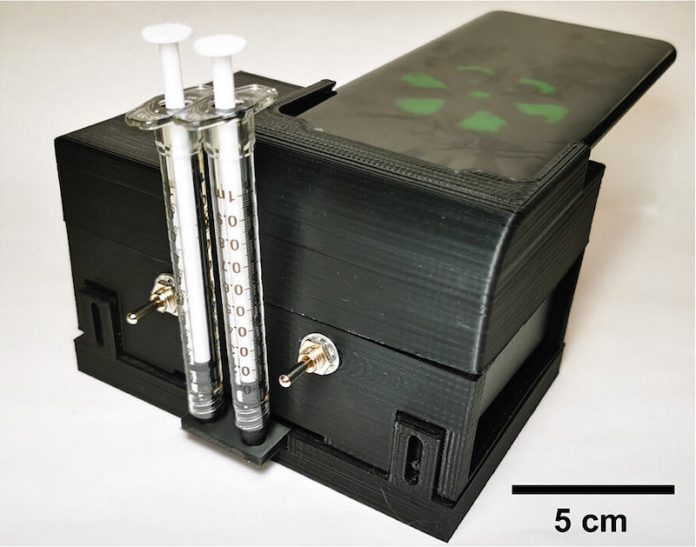
As COVID-19 continues to spread, bottlenecks in supplies and laboratory personnel have led to long waiting times for results in some areas.
In a new study, researchers found have demonstrated a prototype of a rapid COVID-19 molecular test and a simple-to-use, portable instrument for reading the results with a smartphone in 30 minutes.
It could enable point-of-care diagnosis without needing to send samples to a lab.
The research was conducted by a team at the University of Illinois at Urbana-Champaign.
Typical tests for SARS-CoV-2, the virus that causes COVID-19, take a sample from a patient with a long nasopharyngeal swab, put that swab into a substance called viral transport media, and send it to a lab for a multistep process of extracting, isolating, and multiplying the telltale RNA inside the virus.
This RNA multiplication process, called RT-PCR, requires several temperature fluctuation cycles, specialized equipment, and trained personnel.
In the study, the Illinois team used a simpler process to analyze the viral transport media, called LAMP, which bypasses the RNA extraction and purification steps.
The team says LAMP only needs one temperature—65 C—so it is much easier to control
Also, LAMP works more robustly than PCR, especially when there are contaminants in the test sample.
Doctors can just briefly heat the sample, break open the virus, and detect the genetic sequence that specifically identifies SARS-CoV-2.
The researchers compared the LAMP assay with PCR, first using synthetic nasal fluid spiked with the virus and then with clinical samples.
They found the results were in agreement with PCR results, and they documented the sensitivity and specificity of the LAMP test.
Then, the researchers incorporated the LAMP assay onto a small 3-D-printed microfluidic cartridge that has two input slots for syringes: one for the sample-containing viral transport media, one for the LAMP chemicals. Once the two are injected, they react within the cartridge.
The team is working with Fast Radius Inc., a Chicago-based technology company to manufacture the microfluidic cartridges.
The cartridge can be inserted into a hand-held portable instrument with a heating chamber, which heats the cartridge to 65 degrees Celsius for the duration of the reaction, and a smartphone cradle for reading the results.
In approximately 30 minutes, a positive result will emit fluorescent light.
The researchers demonstrated the portable device with additional clinical samples and found the results matched those of the standard PCR lab procedure.
If this test can be widely available in the future, doctors can test for COVID-19 at public events, auditoriums, large gatherings, and potentially even at home for self-testing.
One author of the study is Rashid Bashir, a professor of bioengineering and the dean of the Grainger College of Engineering at Illinois.
The study is published in PNAS.
Copyright © 2020 Knowridge Science Report. All rights reserved.



